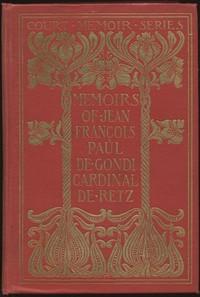Read this ebook for free! No credit card needed, absolutely nothing to pay.
Words: 51987 in 9 pages
This is an ebook sharing website. You can read the uploaded ebooks for free here. No credit cards needed, nothing to pay. If you want to own a digital copy of the ebook, or want to read offline with your favorite ebook-reader, then you can choose to buy and download the ebook.


: Memoirs of Jean François Paul de Gondi Cardinal de Retz — Volume 2 by Retz Jean Fran Ois Paul De Gondi De - France Court and courtiers; France History Louis XIV 1643-1715; Mazarin Jules 1602-1661
MEMOIRS OF JEAN FRANCOIS PAUL de GONDI, CARDINAL DE RETZ
Written by Himself
MADAME:--I lay it down as a maxim, that men who enter the service of the State should make it their chief study to set out in the world with some notable act which may strike the imagination of the people, and cause themselves to be discussed. Thus I preached first upon All Saints' Day, before an audience which could not but be numerous in a populous city, where it is a wonder to see the Archbishop in the pulpit. I began now to think seriously upon my future conduct. I found the archbishopric sunk both in its temporals and spirituals by the sordidness, negligence, and incapacity of my uncle. I foresaw infinite obstacles to its reestablishment, but perceived that the greatest and most insuperable difficulty lay in myself. I considered that the strictest morals are necessarily required in a bishop. I felt myself the more obliged to be strictly circumspect as my uncle had been very disorderly and scandalous. I knew likewise that my own corrupt inclinations would bear down all before them, and that all the considerations drawn from honour and conscience would prove very weak defences. At last I came to a resolution to go on in my sins, and that designedly, which without doubt is the more sinful in the eyes of God, but with regard to the world is certainly the best policy, because he that acts thus always takes care beforehand to cover part of his failings, and thereby to avoid the jumbling together of sin and devotion, than which nothing can be more dangerous and ridiculous in a clergyman. This was my disposition, which was not the most pious in the world nor yet the wickedest, for I was fully determined to discharge all the duties of my profession faithfully, and exert my utmost to save other souls, though I took no care of my own.
The Archbishop, who was the weakest of mortals, was, nevertheless, by a common fatality attending such men, the most vainglorious; he yielded precedence to every petty officer of the Crown, and yet in his own house would not give the right-hand to any person of quality that came to him about business. My behaviour was the reverse of his in almost everything; I gave the right-hand to all strangers in my own house, and attended them even to their coach, for which I was commended by some for my civility and by others for my humility. I avoided appearing in public assemblies among people of quality till I had established a reputation. When I thought I had done so, I took the opportunity of the sealing of a marriage contract to dispute my rank with M. de Guise. I had carefully studied the laws of my diocese and got others to do it for me, and my right was indisputable in my own province. The precedence was adjudged in my favour by a decree of the Council, and I found, by the great number of gentlemen who then appeared for me, that to condescend to men of low degree is the surest way to equal those of the highest.
I dined almost every day with Cardinal Mazarin, who liked me the better because I refused to engage myself in the cabal called "The Importants," though many of the members were my dearest friends. M. de Beaufort, a man of very mean parts, was so much out of temper because the Queen had put her confidence in Cardinal Mazarin, that, though her Majesty offered him favours with profusion, he would accept none, and affected to give himself the airs of an angry lover. He held aloof from the Duc d'Orleans, insulted the late Prince, and, in order to support himself against the Queen-regent, the chief minister, and all the Princes of the blood, formed a cabal of men who all died mad, and whom I never took for conjurers from the first time I knew them. Such were Beaupre, Fontrailles, Fiesque, Montresor, who had the austerity of Cato, but not his sagacity, and M. de Bethune, who obliged M. de Beaufort to make me great overtures, which I received very respectfully, but entered into none. I told Montresor that I was indebted to the Queen for the coadjutorship of Paris, and that that was enough to keep me from entering into any engagement that might be disagreeable to her Majesty. Montresor said I was not obliged for it to the Queen, it having been ordered before by the late King, and given me at a crisis when she was not in a condition to refuse it. I replied, "Permit me, monsieur, to forget everything that may diminish my gratitude, and to remember that only which may increase it." These words were afterwards repeated to Cardinal Mazarin, who was so pleased with me that he repeated them to the Queen.
The families of Orleans and Conde, being united by interest, made a jest of that surly look from which Beaufort's cabal were termed "The Importants," and at the same time artfully made use of the grand appearance which Beaufort never failed to assume upon the most trifling occasions. His counsels were unseasonable, his meetings to no purpose, and even his hunting matches became mysterious. In short, Beaufort was arrested at the Louvre by a captain of the Queen's Guards, and carried on the 2d of September, 1643, to Vincennes. The cabal of "The Importants" was put to flight and dispersed, and it was reported over all the kingdom that they had made an attempt against the Cardinal's life, which I do not believe, because I never saw anything in confirmation of it, though many of the domestics of the family of Vendome were a long time in prison upon this account.
The Marquis de Nangis, who was enraged both against the Queen and Cardinal, for reasons which I shall tell you afterwards, was strongly tempted to come into this cabal a few days before Beaufort was arrested, but I dissuaded him by telling him that fashion is powerful in all the affairs of life, but more remarkably so as to a man's being in favour or disgrace at Court. There are certain junctures when disgrace, like fire, purifies all the bad qualities, and sets a lustre on all the good ones, and also there are times when it does not become an honest man to be out of favour at Court. I applied this to the gentlemen of the aforesaid cabal.
I must confess, to the praise of Cardinal de Richelieu, that he had formed two vast designs worthy of a Caesar or an Alexander: that of suppressing the Protestants had been projected before by Cardinal de Retz, my uncle; but that of attacking the formidable house of Austria was never thought of by any before the Cardinal. He completed the first design, and had made great progress in the latter.
You will wonder, no doubt, that nobody was then aware of the consequence of imprisoning M. de Beaufort, when the prison doors were set open to all others. This bold stroke--at a time when the Government was so mild that its authority was hardly felt--had a very great effect. Though nothing was more easy, as you have seen, yet it looked grand; and all acts of this nature are very successful because they are attended with dignity without any odium. That which generally draws an unaccountable odium upon even the most necessary actions of statesmen, is that, in order to compass them, they are commonly obliged to struggle with very great difficulties, which, when they are surmounted, are certain to render them objects both of envy and hatred. When a considerable occasion offers, where there is no victory to be gained because there is no difficulty to encounter, which is very rare, it gives a lustre to the authority of ministers which is pure, innocent, and without a shadow, and not only establishes it, but casts upon their administration the merit of actions which they have no hand in, as well as those of which they have.
When the world saw that the Cardinal had apprehended the man who had lately brought the King back to Paris with inconceivable pride, men's imaginations were seized with an astonishing veneration. People thought themselves much obliged to the Minister that some were not sent to the Bastille every week; and the sweetness of his temper was sure to be commended whenever he had not an opportunity of doing them harm. It must be owned that he had the art of improving his good luck to the best advantage. He made use of all the outward appearances necessary to create a belief that he had been forced to take violent measures, and that the counsels of the Duc d'Orleans and the Prince de Conde had determined the Queen to reject his advice; the day following he seemed to be more moderate, civil, and frank than before; he gave free access to all; audiences were easily had, it was no more to dine with him than with a private gentleman. He had none of that grand air so common to the meaner cardinals. In short, though he was at the head of everybody, yet he managed as if he were only their companion. That which astonishes me most is that the princes and grandees of the kingdom, who, one might expect, would be more quick-sighted than the common people, were the most blinded.
Being ordered by my Lord Archbishop of Paris to take care of his diocese in his absence, my first business was, by the Queen's express command, to visit the Nuns of the Conception, where, knowing that there were above fourscore virgins, many of whom were very pretty and some coquettes, I was very loth to go for fear, of exposing my virtue to temptation; but I could not be excused, so I went, and preserved my virtue, to my neighbour's edification, because for six weeks together I did not see the face of any one of the nuns, nor talked to any of them but when their veils were down, which gave me a vast reputation for chastity. I continued to perform all the necessary functions in the diocese as far as the jealousy of my uncle would give me leave, and, forasmuch as he was generally so peevish that it was a very hard matter to please him, I at length chose to sit still and do nothing. Thus I made the best use imaginable of my uncle's ill-nature, being sure to convince him of my honest intentions upon all occasions; whereas had I been my own master, the rules of good conduct would have obliged me to confine myself to things in their own nature practicable.
The Cardinal Mazarin confessed to me, many years afterwards, that this conduct of mine in managing the affairs of the diocese, though it did him no injury, was the first thing that made him jealous of my growing greatness in Paris. Another thing alarmed him with as little reason, and that was my undertaking to examine the capacity of all the priests of my diocese, a thing of inconceivable use and importance. For this end I erected three tribunals, composed of canons, curates, and men of religious orders, who were to reduce all the priests under three different classes, whereof the first was to consist of men well qualified, who were therefore to be left in the exercise of their functions; the second was to comprehend those who were not at present, but might in time prove able men; and the third of such men as were neither now nor ever likely to become so. The two last classes, being separated from the first, were not to exercise their functions, but were lodged in separate houses; those of the second class were instructed in the doctrine, but the third only in the practice of piety. As this could not but be very expensive, the good people opened their purses and contributed liberally. The Cardinal was so disturbed when he heard of it that he got the Queen to send for my uncle upon a frivolous occasion, who, for reasons as frivolous, ordered me to desist. Though I was very well informed, by my good friend the Almoner, that the blow came from Court, I bore it with a great deal more patience than was consistent with a man of my spirit, for I did not seem to take the least notice of it, but was as gracious to the Cardinal as ever. But I was not so wary in another case which happened some time after, for honest Morangis telling me I was too extravagant, which was but too true, I answered him rashly, "I have made a calculation that Caesar, when at my age, owed six times as much." This remark was carried, unluckily, by a doctor then present, to M. Servien, who told it maliciously to the Cardinal, who made a jest of it, as he had reason to do, but he took notice of it, for which I cannot blame him.
Free books android app tbrJar TBR JAR Read Free books online gutenberg
More posts by @FreeBooks









